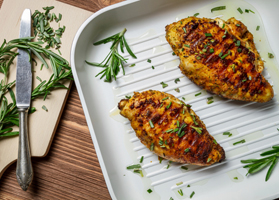Best PCOS Friendly Electric Pressure Cooker Settings
Discover optimal pressure cooker settings for PCOS-friendly meals to save time while maximizing nutrients. Perfect guide for healthy meal prep.
Try this classic dish that?s been spiced up with some fresh rosemary. You can pair it with this month?s Roasted Asparagus Salad if you?d like!
This recipe includes superfoods such as:
Transform your health with tailored 7-day meal plans designed specifically for PCOS management. Just $7/month or $59/year.
Get it now →2 teaspoons olive oil
1 teaspoon grated lemon zest
1 tablespoon fresh lemon juice
1 medium garlic clove, minced
1 tablespoon chopped fresh rosemary
1/8 teaspoon salt
1/8 teaspoon pepper
2 boneless skinless chicken breast halves (about 4 ounces each), all visible fat discarded
Cooking spray
3 tablespoons barbecue sauce (lowest sodium available)
1 tablespoon balsamic vinegar
1 teaspoon honey
In a nonmetallic bowl, stir together the oil, lemon zest, lemon juice, garlic, rosemary, salt, and pepper. Add the chicken, turning to coat. Cover and refrigerate for 30 minutes to 8 hours. If marinating for more than 30 minutes, turn several times.
Lightly spray the grill rack with cooking spray. Preheat the grill on medium heat.
Grill the chicken for 4 to 5 minutes on each side, or until no longer pink in the center. (The internal temperature should reach at least 165 degrees F). Transfer to plates.
Meanwhile, in a small saucepan, whisk together the barbecue sauce, vinegar, and honey. Cook over medium-low heat for 3 to 4 minutes, or until heated through, stirring occasionally. Spoon the mixture over the cooked chicken.

Transform your health with tailored 7-day meal plans designed specifically for PCOS management. Just $7/month or $59/year.
Get it now →Serving Size: 2
| Amount Per ONE Serving | ||
|---|---|---|
| Calories 235 kcal | ||
| Fat 7 g | ||
| Carbohydrate 17 g | ||
| Protein 24 g | ||
| Cholesterol 65 mg | ||
| Saturated Fat 1.4 g | ||
| Sodium 390 mg | ||
| Sugar 13 g | ||
💡 Introducing the 10/10 PCOS Solution:
Ten Delicious Crockpot Recipes that take just 10 minutes to prep!
Say goodbye to hours in the kitchen and hello to clean, PCOS-friendly meals made effortlessly.
👉 Click here to grab your 10/10 PCOS Solution today! Try The 10/10 PCOS Solution: Ten Crockpot Recipes That Take Just Ten Minutes to Prep
Managing PCOS can be challenging, but you don't have to do it alone. Join our supportive community to connect with others who understand what you're going through, share tips, and get encouragement. Here's how you can get involved:
Subscribe to our Newsletter: Receive PCOS-friendly recipes, tips, research updates, and more delivered straight to your inbox. Stay informed and empowered with the latest information and support.
Join our Telegram Channel: Stay updated with the latest tips and advice on managing PCOS.
Follow us on Facebook: Engage with our community, participate in discussions, and get support from others.
Break the cycle with the PCOS Meal Planner - your personalized guide to eating better, feeling better, and managing PCOS symptoms. Take control today!

Forget the frustrating cycle of weight loss attempts, endless medications, and living in discomfort. Introducing the PCOS Meal Planner. A meal planning guide that goes beyond temporary fixes to offer a comprehensive strategy, empowering you to ignite a transformation towards lasting health and happiness. Step into a world where you control your PCOS, not the other way around.
Unlock Your PCOS Freedom Now.
Discover optimal pressure cooker settings for PCOS-friendly meals to save time while maximizing nutrients. Perfect guide for healthy meal prep.
Learn essential safety tips for using mandoline slicers in PCOS meal prep to efficiently prepare vegetables while protecting your hands.
Discover the top silicone baking mats for PCOS-friendly cooking, making healthy baking easier while managing hormonal balance through better tools.
Master reading Asian grocery store nutrition labels while managing PCOS. Get practical tips for making PCOS-friendly food choices.
Discover essential kitchen timers for PCOS-friendly meal prep, helping you manage cooking times and portions for better hormone balance and health.
Master cooking frozen vegetables for PCOS with our comprehensive guide. Learn nutrient-preserving techniques and quick meal prep tips for managing PCOS.
Learn to establish a supportive workplace PCOS network that empowers professionals while managing PCOS symptoms through community and understanding.
Discover nourishing PCOS-friendly dips perfect for raw vegetables. Learn how to make healthy, hormone-balancing dips that make snacking both delicious and nutritious.
Struggling with PCOS while working night shifts? Learn effective meal timing strategies to manage symptoms and feel your best.